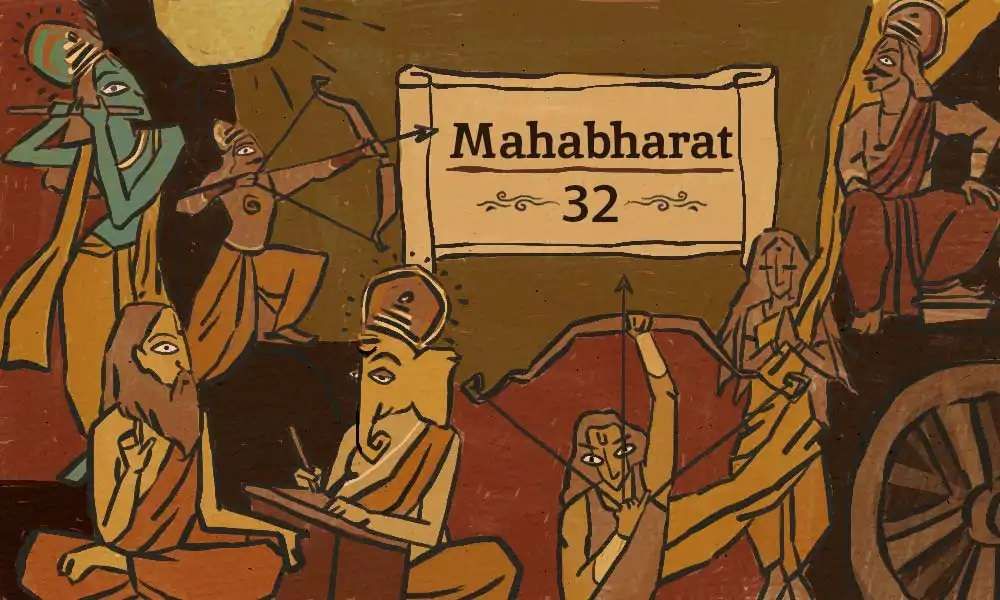Mahabharat Episode 32: Krishna’s Vow to Draupadi
In this episode of the Mahabharat series, the loaded die is cast. An enraged Draupadi receives a vow of revenge from Krishna. A game shows us the quality of the protagonists; sides are decided. The throw of a dice unfurl thirteen years later to bring us to the eve of war.

What has happened so far: In a game of dice with the wily Shakuni, Yudhishthira staked his wealth, his kingdom, even his own brothers and their wife Draupadi, and lost everything to the Kauravas. Upon Duryodhana’s instruction, Dushasana dragged Draupadi into the court assembly and attempted to disrobe her. Thanks to Krishna’s remote intervention, he did not succeed.
After the First Dice Game
Sadhguru : This dastardly event that was perpetrated in the court of the Kuru turned gentle beings into beasts. The joyful, playful, ever mischievous Bhima transformed into a beastly Bhima. He took a vow to shatter Duryodhana’s thigh and to drink Dushasana’s blood. Draupadi took a vow to leave her hair loose until she got to wash it in Dushasana’s blood. And four of the five Pandava brothers, except Yudhishthira, took a vow to kill every Kaurava. But Bhima said, “No, leave it to me. I am going to kill all one hundred of them.”When this horrific incident occurred, Draupadi, a young married woman and a queen who enjoyed her life, flew into a rage and displayed her strength. Alarmed by the way the situation unfolded, Dhritarashtra intervened and said that whatever Yudhishthira had staked and lost in the dice game should be returned. He offered that Draupadi ask for whatever she wanted. She said, “I want freedom for my husbands.” Dhritarashtra said, “Granted, they are free men. What else?” She said, “They must have their kingdom back.” He said, “Granted, yes. Ask for one more thing.” She said, “It is not wise for a human being to be greedy. This is all I want.”
Subscribe
Dhritarashtra said, “Don’t you want anything for yourself? Ask for something for yourself.” She was still not free. She said, “I don’t want anything; I am willing to be a slave. Let these men who staked me in the game be free. Let them be kings. I have loved them. But it doesn’t matter. I don’t want to ask for a third boon.” At that point, Dhritarashtra returned everything the Pandavas had lost to them and granted them and Draupadi their freedom. The Kauravas, Karna, and Shakuni were totally disappointed. Karna said, “Such great Kshatriyas, and they were saved by a woman! Brave men are these. They got away cheaply.” That was the taunt that brought them back again to the second dice game, and they lost everything once again. The Pandavas and Draupadi had to go to the forest for twelve years, and remain incognito for another year. In case they were found out, they would have to extend their exile for twelve more years.
Krishna’s Vow
When Draupadi related to Krishna what had happened to her, he vowed to avenge this infamous act. Draupadi cried bitter tears and said to Krishna, “Though you saved me at the last moment, you were not there, and this is what they did to me. Until I see Dushasana’s blood, I cannot forget this.” So Krishna took a vow, saying, “The heavens may fall. The Himalaya may be leveled. The seas may run dry as a dead man’s bones. The earth herself may burst asunder, but I will keep my oath to you. To avenge the crime against you, there will be a war to end all wars. Your eyes, which shed drops of fire today, will see all one hundred Kauravas dead upon the battlefield. Wipe your tears because the tears are the prerogative of the one hundred widows in Hastinapur.”
Good and Bad in the Story and in Life
When we look at the whole story of Mahabharat, some characters seem good or great, others seem bad or evil. How does this happen? As such, there is no goodness and badness. It is just the choices we make in crucial moments that make us seem good or bad. Some people repeatedly make choices that are harmful to themselves and everyone around them. Some people make choices with the constant concern of what will happen because of their choices. This is all the difference between Duryodhana and Yudhishthira, or just about anyone.
What kind of choices do you make in different situations that you face in your life? Are the choices arising from exclusiveness or inclusiveness? Are the choices arising from the needs of the body or the nature of the being? Are the choices arising from your individuality or the universal nature of life? You have the choice to function as a smaller or larger being. One who functions as a larger being gets judged as a great being. One who functions in between becomes a good being. One who functions from the smallness of who he is becomes a bad being.
To be continued
Editor’s Note: A version of this article was originally published in Forest Flower, August 2017.


